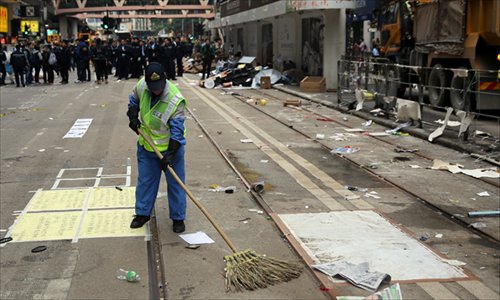HK leader declares Occupy protests over
Police plan to investigate, arrest protest ringleaders within three months

A worker sweeps up rubbish at the Occupy protest site in the Causeway Bay district of Hong Kong on Monday. Police have cleared Hong Kong's last remaining site of the two-month protest. Photo: AFP
Hong Kong Chief Executive Leung Chun-ying declared an end to the illegal Occupy protest Monday after police dismantled the last Occupy protest site and arrested more than a dozen protesters.
Leung said in a press conference that following the completion of clearance work at the last protest camp site, the illegal protest which has lasted for more than two months has come to an end. Hongkongers should consider what kind of democracy the city should pursue, he added.
"Universal suffrage should follow the decision made by the National People's Congress and the Basic Law," he said. "Democracy without law is not a real democracy but anarchy."
Leung also pointed out that the illegal Occupy protest has had a great impact on Hong Kong's economy, including on tourism, retail businesses and the transportation sector, with figures on exact economic losses expected to emerge gradually.
About 100 police officers cleared the last protest site in the busy Causeway Bay area Monday morning. Seventeen protesters were arrested after they refused to move, including Chan Yuk-hin, a member of the Standing Committee of the Hong Kong Federation of Students, one of the main Occupy groups, and Kenneth Chan Ka-lok, a pan-democratic lawmaker.
A small group of protesters, who had been occupying area outside Hong Kong's Legislative Council since last Thursday after police dismantled the main protest site in Admiralty district, were also asked to withdraw in the afternoon. Police were not deployed and the protesters left the site peacefully.
All roads and streets are reopened and public transport services have resumed fully after the 79-day illegal occupation.
Andy Tsang Wai-hung, Commissioner of the Hong Kong Police Force, said the task was challenging and complicated as the illegal protest lasted for a long time and involved large numbers of people, while the form of the protests and the degree of intensity were unprecedented.
A total of 955 people were arrested throughout the Occupy movement and another 75 surrendered themselves. Some 130 police officers were injured, according to Tsang. He said police will investigate the movement and arrest the main ringleaders within three months.
Despite all protest sites having been dismantled, protesters said they will not give up their demands for open nominations for the 2017 chief executive election.
The leader of the Scholarism student group, Joshua Wong Chi-fung and the secretary-general of the Federation of Students, Alex Chow Yung-kang, said they will continue their movement through other forms of civil disobedience. They also said a new Occupy protest may take place next year.
Legislator Tang Ka-piu told the Global Times that he would not be surprised if there were some small-scale civil disobedience movements in the future, since the protesters did not withdraw voluntarily. However, he does not think such actions will be effective or long-lived, as the majority of citizens will register their disapproval.
Wong and Lester Shum, the deputy secretary-general of the Federation of Students, were at a hearing Monday morning for contempt of court as they refused to withdraw during the police clearance at the Mongkok protest site last month. A lawyer for the defendants said afterward that the hearing was adjourned until January.

Graphics: GT
More than 70% see Occupy movement as failure: poll
About 73 percent of people on the Chinese mainland polled by the Global Poll Center on Monday said they believed the Occupy protests in Hong Kong have failed, although nearly 50 percent said the protesters could still attempt to press their demands in other ways.
The center polled 1,422 people aged over 18 from seven major Chinese mainland cities including Beijing, Shanghai and Guangzhou.
When asked if respondents are confident about the future development of Hong Kong, more than 30 percent said they are confident and 46.4 percent said they have "some confidence," but much depends on Hong Kong itself.
Zhang Dinghuai, deputy director of Shenzhen University's Center for Basic Laws of Hong Kong and Macao told the Global Times that the main victim of the whole Occupy movement is Hong Kong itself because the local economy was severely impacted.
"A number of countries, such as Australia, had previously issued travel alerts for Hong Kong. This shows that the international competitiveness of Hong Kong was severely affected," he said.
Tang Dahua, of the Peking University's Hong Kong and Macao Studies Center, said although the Occupy movement has failed, many deeper problems remain to be solved. The movement also indicates the diversity of Hong Kong society's opinions, which need to be properly guided.
Hong Kong and the central governments need to work harder in explaining policies to people who still have doubts over political reform, Tang said.
Global Times